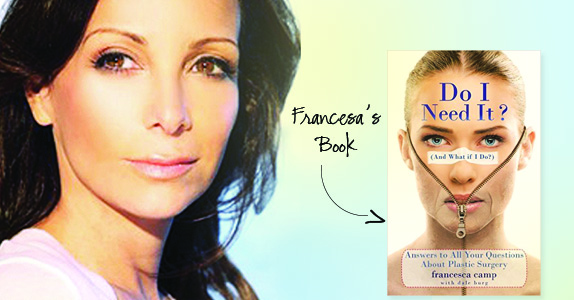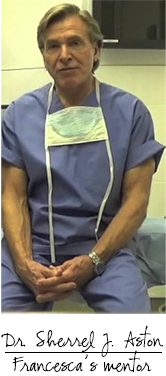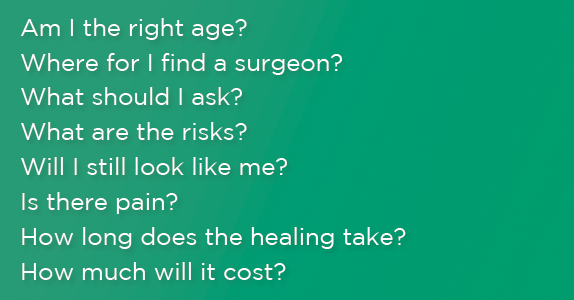FabOverFifty is delighted to announce that we’ve formed a partnership with Francesca Camp, a leading independent plastic and cosmetic surgery consultant, in the US and abroad, who is becoming our plastic surgery guru. Francesca will be writing a monthly column and can answer many of your questions about invasive and non-invasive procedures. Of course, we’ll still have our valuable Ask A Plastic Surgeon Tool, but Francesca can provide an additional viewpoint, as someone who has worked with thousands of women who’ve had surgery, or are considering it.
“If you’re like nine out of ten of my clients, the first question on your mind is not what kind of surgery you need or who should perform it but something much more basic: ‘Do I need it?’” which happens to be the title of Francesca’s new book.
“In fact there are times when I tell people that they don’t. I’m an independent practitioner, and I’m not on anyone’s payroll. I don’t get compensated for referrals, so I don’t stand to gain or lose by recommending any services. My professional role is to offer advice to people who are unhappy about their appearance and don’t know what to do and where to start. Not all the solutions I offer involve surgery,” she explains in the very first chapter.
![]()
Meet Francesca!
![]()
When Francesca Camp was in her 20s, long before anyone but movie stars and Park Avenue matrons had “work done,” she had a complete surgical makeover on her young, pretty face. It wasn’t by choice, however. A five-car accident left Francesca with a fractured nose, shattered, left cheekbone and lacerations, and she needed to find a competent plastic surgeon to reshape her disfigured face.

Before the accident, Francesca had worked with burn patients in Chile and, as a graduate student, with inner city and battered and abused women, experiences that taught her the psychological importance of feeling “good about your appearance.” Forced to wait a year for her face to fully heal, before she could get the plastic surgery to fix it, Francesca learned even more, first hand, about compassion and empathy. She says she has two sides: “Mother Teresa and the vanity side.”
 Although it wasn’t a pretty–or voluntary–way to get involved with plastic surgery, that fateful accident led her to be treated by, and then work for, Dr. Sherrell Aston, one of the New York’s leading plastic surgeons. Francesca also earned a license as a paramedical esthetician. During the six years she was Dr. Aston’s employee, she became the one who answered all his patients’ questions. She learned what people want and need to know. A good resource for information, Francesca also gave patients reassurance and confidence.
Although it wasn’t a pretty–or voluntary–way to get involved with plastic surgery, that fateful accident led her to be treated by, and then work for, Dr. Sherrell Aston, one of the New York’s leading plastic surgeons. Francesca also earned a license as a paramedical esthetician. During the six years she was Dr. Aston’s employee, she became the one who answered all his patients’ questions. She learned what people want and need to know. A good resource for information, Francesca also gave patients reassurance and confidence.
Encouraged by the excellent response to her skin care and counseling services, Francesca eventually decided to open her own practice, and she’s been a independent plastic/cosmetic surgery consultant for almost 20 years. “Because of my professional connections to the world’s leading plastic and cosmetic surgeons and my ability to know what to look for and what to research, I am able to refer people to doctors anywhere who specialize in the areas of their concern, who have the right credentials, and who will perform the proper procedures with competence,” Francesca explains in her new book, Do I Need It? (And What if I Do?) Answers to All Your Questions About Plastic Surgery, with Dale Burg
“This really is a rule book, a hand-holding guide for the entire process,” Francesca told me when we met for coffee and an interview. “I used to write the pre- and post-op instructions for plastic surgeons, and the book provides the answers to all the questions that patients asked.” Besides answering the paramount question, “Do I Need Plastic Surgery?” these are among the questions answered in the book:

“When I recommended to a CEO client, who ran a big corporation, that she not do something she was considering, post-surgery, she took my face in her hands and said to me: ‘When it comes to this, I have no common sense,’” Francesca said, demonstrating that even women who make high-level decisions all day long need guidance when it comes to their looks.
Written in simple language, with a reassuring attitude and a touch of humor ( “A really good doctor makes you look like yourself, only better. He or she can’t turn back the clock and make you look twenty-five–unless you’re thirty!”), the book makes the plastic surgery process less intimidating and offers practical advice you won’t find anywhere else. Francesca even covers the type of bedding to use for your recuperation!
During our chat, Francesca answered a few of my own questions. Read what she had to say.
![]()
![]()
Why do you think that plastic surgery naysayers are so vocal?
Many women think they’ve ‘earned’ their wrinkles or stretch marks, and they become judgmental. But I say, ‘never say never. You’re getting your hair colored, you’re getting your nails done, you’re putting on makeup, and you’re working out at the gym. Plastic surgery is another way for you to be a better you.’
Ninety-eight percent of my patients don’t want to look 20. They want to look like themselves, but just a little bit better.
Where do you work and do you get a referral fee from the doctors you recommend?
I have offices in LA; New York; Naples, Florida, and Vienna, Austria, where I’m in a wonderful new clinic, but still independent from the doctors who practice there. I get no kickbacks or referral fees. I don’t personally know every single surgeon I recommend, but my connections, and researching experience, always lead me to the best doctors for my patients.
I lecture at medical symposiums, and I’ve collected great doctors along the way. I’ve been in the OR observing surgery. I have to see what my patients are going through so I can help them heal. My client list is like a who’s who. They come to see me from around the world.
If a woman is on the fence about having plastic surgery, how can you convince her to at least have a consult?
 You really have to listen and find out why someone is on the fence. People still are afraid. So I listen carefully to hear why they’re afraid.
You really have to listen and find out why someone is on the fence. People still are afraid. So I listen carefully to hear why they’re afraid.
Those I call my ‘merry-go-round patients’ have been to see seven doctors, which is always a red flag. I’d rather have someone who has questions and knows what she wants. Women open up more to me than to surgeons. Surgeons actually refer women to me, before consulting with them.
What trends are you seeing today in terms of procedures?
1. More women are getting non-invasive treatments, but it’s becoming a double-edge sword. I’m seeing bad fillers that result in squinty eyes and over-filled cheeks. If you don’t have a line on your face, it looks freaky to me. Mothers and daughters are starting to look like each other. You have to leave a couple of wrinkles to look natural. Less is definitely more, even with fillers. Sometimes, only the knife is going to do the trick, but you also have to eat right, drink enough, and exercise.
2. Chemical or laser peels are great, but you must make sure a qualified doctor does it.
3. A new filler, Juvederm Voluma XC, is getting good results. It’s doing a nice job on the lips.
4. Many women will tell me what a cousin’s friend had done, for example, and who did it, and will decide on which plastic surgeon to use based on word of mouth. I make my decisions based on the volume a surgeon does. If a doctor is doing 600 of a certain procedure a year, he generally knows what he’s doing.
5. More women over 50 are having the tips of their noses refined. The eyes and nose make the greatest difference in your looks.
6. I am against doctors who aggressively promote before-and-after-photos, which is becoming more and more prevalent.
How do younger surgeons today differ from ‘old-school’ men in their 60s, let’s say?
You don’t hit your stride as a plastic surgeon until your late 40s. Plastic surgery has changed dramatically in the last 15 years, and the new boys (under 50) are learning the new techniques. Healing time is quicker; scars are shorter; there are fewer invasive techniques, and doctors are using lasers and injections with surgery.
Are the older doctors keeping up with the changes and should you avoid a doctor older than 60?
If you were a great doctor in your time, you’ll be a great doctor now, but only if you’re willing to keep up with the new techniques. I’ve also seen young doctors who aren’t up on techniques.
Plastic surgery symposiums are so important because they promote everyone working together and passing knowledge on to the next generation.
Do women plastic surgeons relate better to women patients?

Yes, they do. I’m now seeing more and more females go into the field, especially in Brazil, which is refreshing. The American and Brazilian Plastic Surgery Societies are now running meetings together, as a matter of fact, and American doctors will go to Brazil for their residencies, where plastic surgery is a craft. Brazilians use very sophisticated techniques, and it’s not frowned on to have plastic surgery there. Patients also are more willing to travel there.
What do you think of websites that promote patient reviews and compare doctor fees for the same procedures?
It’s hard for a layperson to decipher what’s best, what’s true, and what’s not true, so I’m against sites like that. Choosing a plastic surgeon is like choosing a car or a name for your child. No matter what car you say you’re going to buy, or name you choose, someone will ask: ‘Why are you buying THAT car or choosing THAT name? This also isn’t the time for a Kmart special. Just because you put something on a website doesn’t make it true. There’s too much out there on the Internet; it’s too confusing, and many women will decide ‘‘I’ll do it next year,’ rather than do the proper vetting.

What do you say to the fact that cost is one of the biggest obstacles to having plastic surgery?
One client started a “Plastic Surgery Fund” when she stopped smoking. All the money she saved on cigarettes went into the fund. I love that idea.


0 Responses to “Do YOU Need Plastic Surgery?”
Suzzzabelle says:
I wanted to add one other point of view that I have. It might be helpful to women considering surgery. I personally think it’s better to have the face and eyes done sooner/younger rather than later. I believe if you wait until you have jowls and bags, you ARE going to look very different afterwards. It won’t be a re “freshening” it’s more like “a re-do” Of course, it depends on the patient and how quickly they are aging.